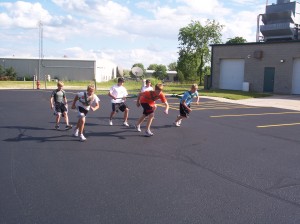Resistance Band Training: It’s More Than Just a Simple Rubber Band

By Dave “The Band Man” Schmitz
Resistance Band Training is a systematic training approach designed to create reactive strength and power using integrated, full-body movements. In short, bands make the body stronger as a unit, not as individual parts.
Reactive strength is our body’s ability to create force in the correct plane, at the correct force level, and at the correct time, both instinctively and efficiently, to counteract changes in momentum.
It’s not just another way to get stronger. It takes strength and makes it usable to the body regardless what functional movement you are doing.
“What Goes Up Must Come Down.”
Deadweight truly is “dead” weight. Dumbbells, sandbags, kettlebells, bodyweight, medicine balls, pulley systems, and barbells are all great training tools that train the body using the principle of gravity.
I will not disagree that we need to be able to handle gravity. But our ability to neuromuscularly control various speeds of momentum in all planes of motion is what will keep us injury-free, more flexible, and performing at high levels on the field and during the day.
Just being strong is not good enough. Resistance Band Training applies the principles of momentum.

“An Object in Motion… Stays in Motion Unless Acted Upon by Another Force.”
Momentum is the #1 reason we get injured, fall, and get beat on the athletic field. We just can’t neuromuscularly control momentum fast enough, and needless to say if we stop teaching our body how to handle it, we are setting ourselves up for potential disaster. The fact is, if we do not stay reactive and strong, we physically get older sooner than we should.
How do bands train our body to handle momentum?
A band’s elastic nature speeds up momentum, which trains our body how to handle faster momentum force than if it were just bodyweight alone. This in turn teaches our nervous system how to identify and activate the muscles needed to respond, which keeps us coordinated and balanced all the time.
Real-World Strength Gains from Resistance Band Training
So which would you rather have the strength to do:
Squat 300 lbs. in a weight room, or play tennis, basketball, or football at a competitive level for many years?
Which is more important: Being strong or preventing falls as you grow older?
Now before I get a boatload of responses, the best answer is both.
However, squatting 300 lbs. does not make you a good athlete on the field and keep you from falling in the real world.
Resistance Band Training will make you athletically strong, not just weight-room strong.
Personally, I want both. How about you?
There are several ways to start training with resistance bands and get yourself, your athletes, and your clients reactively strong and fit.
Let’s use resistance band training to react, not just contract!
Dave “The Band Man” Schmitz


How should I use these bands? Should we go from light resistance to heavy?